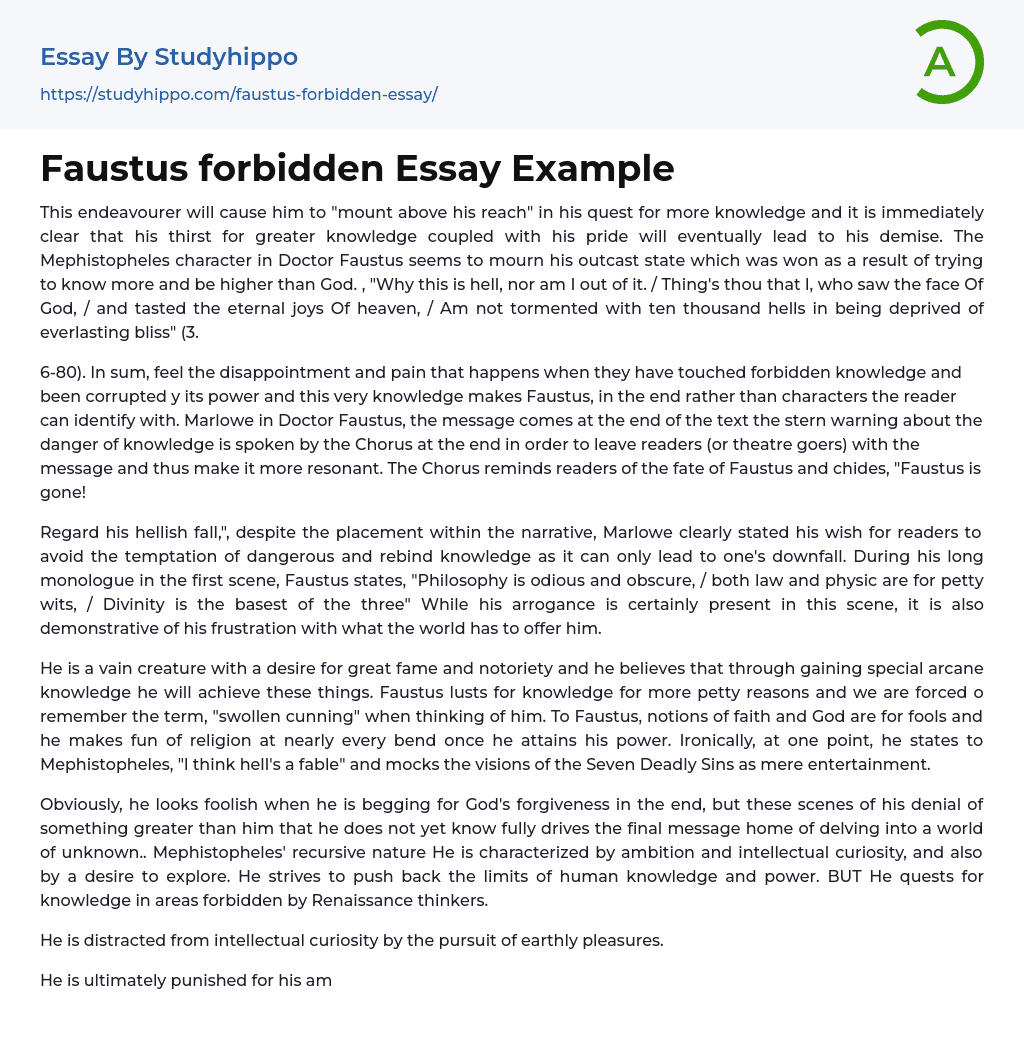The pursuit of knowledge can lead to one's downfall when paired with pride, as seen in the character of Doctor Faustus. The Mephistopheles character laments his outcast state, achieved through attempting to attain a level higher than God. The agony of being deprived of everlasting joy torments him, showing the disappointment and pain that can occur when one is corrupted by forbidden knowledge. In the end, the reader cannot identify with Faustus, but rather feels the danger of knowledge as warned by the Chorus at the end of the text. Marlowe wishes for readers to avoid the temptation of dangerous knowledge, which is emphasized by the fate of Faustus. The message is meant to be resonant and memorable in hopes that readers or theatre goers will take heed and avoid a similar hellish fall.
Faustus expresses his disdain for philosophy,
...law, and divinity during his lengthy soliloquy in the opening scene. Although his arrogance is apparent, it also highlights his dissatisfaction with what the world has to offer. Faustus is a vain character who seeks fame and notoriety through obtaining arcane knowledge. His desire for knowledge is driven by petty motives, as noted by the term "swollen cunning." He ridicules religion and the concept of God once he acquires power, even going so far as to mock visions of the Seven Deadly Sins. Despite his denial of a higher power, Faustus ultimately begs for God's forgiveness, highlighting the message of the risk in exploring the unknown. Mephistopheles shares Faustus' ambition and intellectual curiosity but seeks knowledge in areas forbidden by Renaissance thinkers.
Marlowe's play, Dry Faustus, explores the pursuit of forbidden knowledge
and the unknown through Faustus' ambitions to delve into a world of black magic. However, Faustus is ultimately punished for his overambition, just as Circus in Greek mythology was famously known for exceeding limitations. Marlowe introduces Faustus as a successful doctor full of beneficial knowledge that is embellished with pleasant adjectives like "fruitful" and "sweet". However, Faustus is distracted from intellectual curiosity by his pursuit of earthly pleasures. Despite growing tired of his traditional studies, he seeks a darker path of study that goes beyond what is socially accepted. The emphasis on his eagerness to aspire higher than his station and go beyond human limitations warns readers of the temptation of dangerous and forbidden knowledge, which can only lead to terrible consequences.
The audience critiques Faustus for engaging in cursed necromancy and devilish exercises that transgress supernatural boundaries. His thirst for knowledge goes beyond the natural order of God, which is prominent in Elizabethan beliefs. Marlowe explores the unknown and the persuasive techniques used to tempt Faustus into forbidden knowledge. Faustus questions the afterlife and the nature of hell, to which Mephistopheles responds that earth itself is damned. Faustus has tasted eternal joys of heaven, but is now tormented with ten thousand hells and being deprived of everlasting bliss. The contrast between joys and bliss with hell highlights the idea of the forbidden, as Mephistopheles was out-casted for trying to know more than and be above God. This characterization suggests that Faustus may face the same outcome.The use of exaggeration and alliteration in "ten thousand hells" serves as a warning for the dangers of exploring forbidden knowledge and the unknown. This reinforces the theme of
the play. One possible interpretation is that this technique intensifies Faustus' desires as he continues to pursue knowledge. Mephistopheles constantly reminds Faustus of the torments that await him in the afterlife. The conflict between angels represents Faustus' inner struggles. Some may argue that the angels are a manifestation of his mind, but the evil angel serves as a catalyst for Faustus by tempting him with promises of god-like powers through necromancy, such as commanding the elements on earth like Jove in the sky.
- Anatomy and Physiology essays
- Addiction essays
- Biodegradation essays
- Dental Care essays
- Disease essays
- Disorders essays
- Health Care essays
- Intelligence Quotient essays
- Nutrition essays
- Olfaction essays
- Public Health essays
- Women's Health essays
- World health organization essays
- Cancer essays
- Infectious Disease essays
- Lung Cancer essays
- Neurology essays
- Physical Exercise essays
- Medicine essays
- Sex essays
- Inquiry essays
- Disability essays
- Poison essays
- Action Potential essays
- Nervous System essays
- Childbirth essays
- Puberty essays
- Blood essays
- Kidney essays
- Neuron essays
- Body essays
- Glucose essays
- Sense essays
- Heart essays
- Skeleton essays
- Human Physiology essays
- Eye essays
- Immune System essays
- Muscle essays
- Skin essays
- Brain essays
- Central Nervous System essays
- Human Skin Color essays
- Digestive System essays
- Common sense essays
- Respiration essays
- alcoholism essays
- Smoking essays
- Casino essays
- Tobacco essays




